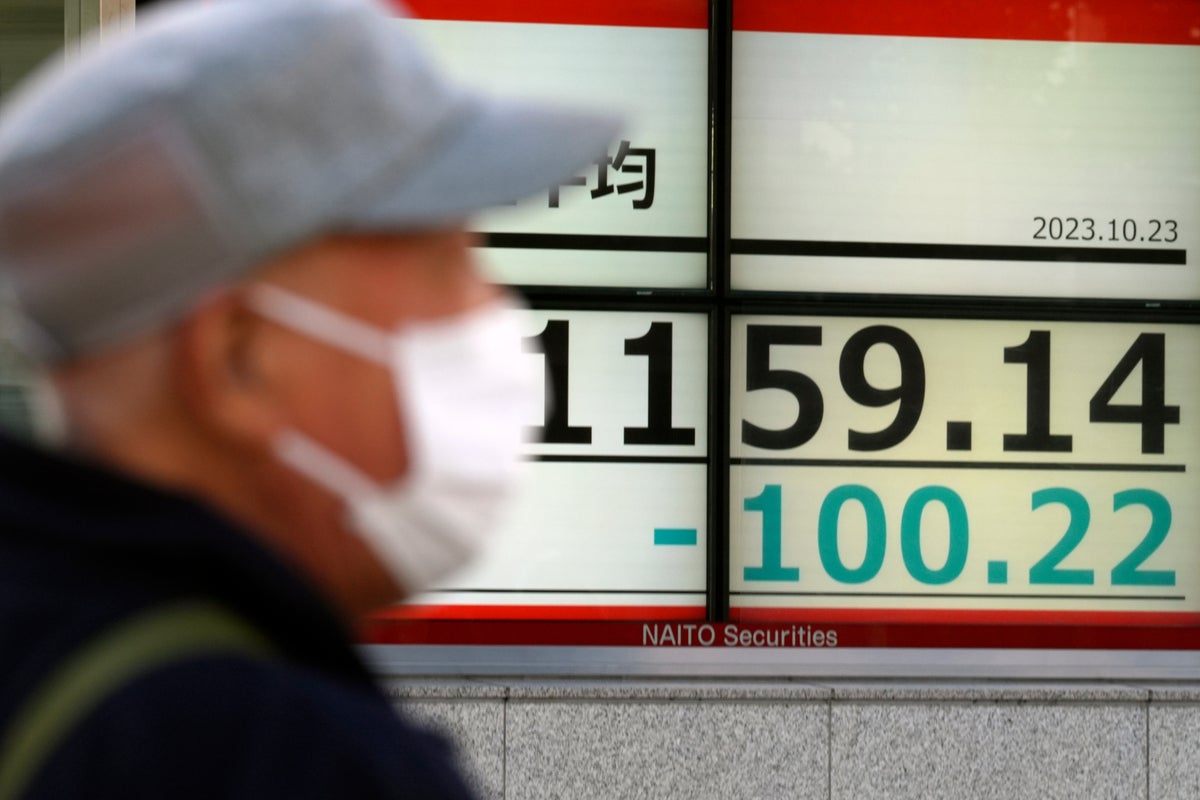
Asian shares were lower on Monday as higher risks of broader conflict in the Middle East clouded market sentiment and bond yields further pressured stocks.
U.S. futures rose while oil prices fell back.
Israel announced its intention on Saturday to step up its attacks on the Gaza Strip in preparation for the next stage of its war on Hamas. Israel’s military spokesman has urged residents of Gaza City to head south in order to ensure their safety.
A barrel of benchmark U.S. oil fell 80 cents to $87.30. It has been bouncing around since the latest Hamas-Israel war began, after leaping from $70 to more than $93 during the summer. It slipped 62 cents to settle at $88.75 on Friday. Brent crude, the international standard, slipped 64 cents to $91.52 per barrel.
Chinese stocks fell to a 1-year low early Monday as foreign investors sold off holdings. The Shanghai Composite index was down 1%, at 2,954.42. Hong Kong's markets were closed for a holiday, as were Thailand's.
International investors have been shifting their assets out of Chinese shares due to escalating geopolitical tensions, challenging economic conditions, and a crisis in the property industry.
Taiwan’s Taiex was 0.9% lower.
Shares in Taiwan-based Foxconn Technology Co., a Fortune 500 company known globally for making Apple iPhones, fell 1.7% after Chinese state media reported over the weekend that the company has been subjected to searches by Chinese tax authorities.
Tokyo’s Nikkei 225 index lost 0.8% to 31,007.12 and the Kospi in Seoul lost 0.5% to 2,363.67. Australia’s S&P/ASX 200 sank 1% to 6,837.70.
India's Sensex edged less than 0.1% higher.
On Friday, Wall Street racked up more losses to close out its worst week in a month. The S&P 500 fell 1.3% for a fourth straight drop to 4,224.16. The Dow sank 0.9% to 33,127.28 and the Nasdaq composite tumbled 1.5% to 12,983.81.
The stock market has been struggling under the weight of the bond market, where the yield on the 10-year Treasury briefly topped 5% late Thursday for the first time since 2007, according to Tradeweb. High yields make borrowing more expensive for everyone, and they slow the economy while dragging on prices for stocks and other investments.
“Indeed, the trajectory of U.S. Treasurys is not merely a question; it is the only question for financial markets,” Stephen Innes of SPI Asset Management said in a commentary. “U.S. government bonds are the critical benchmark reference point against which virtually all other global assets are ultimately priced off.”
The yield on the 10-year Treasury was hanging within a hair of 5% early Friday morning. It’s been generally catching up to the Federal Reserve’s main interest rate, which is already above 5.25% — its highest level since 2001.
The Fed raised its overnight interest rate rapidly hoping to quash high inflation, which has come down from its peak last summer. But higher oil prices threaten to add upward pressure.
SolarEdge tumbled 27.3% Friday after the solar technology company slashed its sales and profit expectations for the current quarter. The company blamed order cancellations in Europe due in part to slower-than-expected installation rates.
Other solar stocks also fell, including a 14.7% drop for Enphase Energy.
Regions Financial sank 12.4% after it reported weaker profit than expected for the latest quarter. Focus has been on the banking industry outside its biggest titans. It was under heavy pressure earlier this year after high interest rates helped cause three high-profile collapses of U.S. banks.
Other regional banks were also weaker. Comerica fell 8.5% despite reporting better profit for the summer than expected. Huntington Bancshares sank 3.9% after likewise topping earnings forecasts.
SLB, the giant oilfield services provider, fell 2.9% despite reporting stronger profit than expected for the summer. Its revenue fell just shy of analysts’ expectations.
On the winning side of Wall Street was Knight-Swift Transportation. The trucking company jumped 11.7% after reporting stronger profit for the latest quarter than expected.
In currency trading, the U.S. dollar rose to 149.94 Japanese yen from 149.87 yen. The euro cost $1.0577, falling from $1.0600 late Friday.







